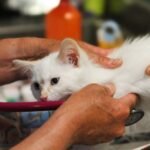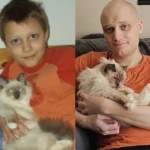Have you ever felt a moment of pure magic with your cat, only to watch them suddenly walk away just as things get cozy? It almost feels personal, doesn’t it? That purr, the nuzzle, the sense that you and your feline friend are about to share a truly special bond—then, poof, they slip away like a whisper in the wind. For cat lovers everywhere, this mysterious retreat can be both baffling and a little heartbreaking. But what if this feline behavior is less about rejection, and more about the complex, beautiful world inside your cat’s mind? Let’s unravel the surprising reasons why some cats seem to back away just when emotional connection feels closest.
The Instincts of Survival Still Linger

Domestic cats may lounge on our sofas, but deep down, their wild instincts still run strong. In the wild, vulnerability can mean danger. When a cat feels emotionally open, it can trigger an instinctive response to protect itself, even in the safety of your home. This retreat is rooted in their ancient need to hide signs of weakness from predators. When you notice your cat pulling away just as the bond deepens, it’s often this primitive voice whispering, “Be careful.” Even though they trust you, their DNA still remembers a world where trust could be risky.
The Complex Language of Feline Communication

Unlike dogs, cats express affection in subtle, sometimes puzzling ways. For cats, closeness isn’t always about physical proximity. Sometimes, walking away might be a sign of comfort—they know you’re there and feel safe enough to explore on their own. On the flip side, if a cat senses too much intensity or feels overwhelmed by your attention, their natural response is to retreat. It’s their way of saying, “I love you, but I need space.” Cats thrive on having control over interactions, so the ebb and flow of closeness is just their unique way of communicating.
Emotional Sensitivity and Overstimulation

Cats are incredibly sensitive creatures. Their senses are finely tuned, and they can pick up on even the slightest changes in mood, scent, or environment. Sometimes, the emotional charge of a deep moment can become a little too much for them. If you’re feeling extra affectionate or your energy is intense, your cat might step back as a way to self-soothe. Imagine a favorite song played too loud—it’s still wonderful, but at that volume, you need a break. For some cats, withdrawing is just hitting the pause button on strong feelings.
Past Experiences and Trust Issues

Just like people, cats carry their past with them. A cat who has experienced trauma, neglect, or inconsistent care may be especially hesitant to fully trust, even when they crave connection. Their retreat can be a defense mechanism, a habit formed to protect themselves from disappointment or harm. It’s not a reflection of their feelings for you, but rather a sign that trust is still growing. With patience and understanding, most cats learn to lower their guard over time, but it’s a journey that can’t be rushed.
The Need for Independence

Feline independence is legendary. Even the most affectionate cats have a strong sense of autonomy. When your cat pulls away just as you feel closest, it’s often their way of reaffirming that they are in charge of their own boundaries. This isn’t a rejection—it’s a gentle reminder of their need for personal space. Respecting this independence not only honors their nature but actually strengthens the bond in the long run. Think of it as a dance, where both partners need moments to move freely.
Body Language: The Silent Clues

Cats communicate volumes with their bodies. The position of their tail, the twitch of their ears, or the dilation of their eyes can all signal how they’re feeling. Sometimes, a retreat is preceded by subtle cues: a quick glance, a shift in posture, or a gentle flick of the tail. Learning to read these signals can help you anticipate when your cat needs a break. By tuning in to their nonverbal communication, you can respond in ways that reassure them, making those special moments even more meaningful.
Building Deeper Trust Through Patience

The journey to a cat’s heart is paved with patience and respect. When your cat retreats, it’s a call to slow down and let trust grow at its own pace. Offering gentle affection, respecting their boundaries, and allowing them to initiate closeness can help create an environment where your cat feels truly safe. Over time, these small acts of understanding transform into a bond that’s deeper and more rewarding than any forced affection. Every time your cat returns to you, it’s a powerful sign of trust earned, not demanded.

Linnea is a born and bred Swede but spends as much time as possible in Cape Town, South Africa. This is mainly due to Cape Town’s extraordinary scenery, wildlife, and atmosphere (in other words, because Cape Town is heaven on earth.) That being said, Sweden’s majestic forests forever hold a special place in her heart. Linnea spends as much time as she can close to the ocean collecting sea shells or in the park admiring puppies.






